Movie Retrospective: Shadow of a Doubt
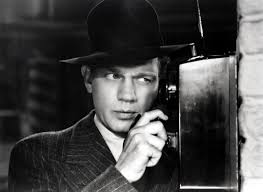
Alfred Hitchcock’s superb 1943 psychological film noir Shadow of a Doubt opens with the ominously-framed Joseph Cotten lying on a bed. A wad of cash is carelessly strewn on the bedside table beside him; some notes have even fallen to the floor. His current landlady enters the room and addresses him as Mr. Spencer. Cotten’s character barely registers her presence until she tells him of the two men who have been asking after him. He looks out the window at the well-suited individuals who are lingering across the street. ‘What do you know?’ we hear him say in his own mind. ‘You’re bluffing. You’ve nothing on me.’ Cotten leaves the premises and manages to give the two men the slip. In a typical signature shot of his, Hitchcock shoots the two men from an elevation as the grinning Cotten regards their faces of puzzlement at his evasion. The particular cityscape which the director presents us with here is not a very aesthetically pleasing one, but he contrasts this with his next location which is the rather idyllic urban milieu of Santa Rosa, California.
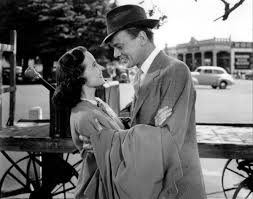
We are next introduced to the character of Charlie Newton (Teresa Wright), a quick-witted young woman who does not appear to appreciate her salubrious environment. Like Cotten’s character, Charlie is also lying back on a bed when we first see her with a contemplative demeanour set in her expression. ‘I’ve come to the conclusion that I give up,’ she complains as she ponders the apparent mundanity of her existence. ‘I guess we’ll just have to wait for a miracle or something.’ Hoping to further the possibility of such an occurrence, Charlie decides to wire her Uncle Charlie (whom she is named after) where he is living in Philadelphia as she supposes. It’s evident that the young woman idolises her uncle; she declares that he is the one person who can get her family out of their current rut. But Uncle Charlie is already on his way to Santa Rosa as Charlie discovers at the post office; he is due to arrive on the train the following day. Upon reading his telegram, Charlie remarks on the ‘telepathy’ which she believes exists between her and her mother’s younger brother. It’s not the last time such a bond is alluded to in the script by Thornton Wilder, Sally Benson and Alma Reville (better known to you and me as Lady Hitchcock). It’s a motif which runs throughout the film and one which will be pointed out by the mysterious Uncle Charlie himself.
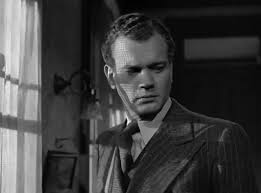
There follows a marvellous shot in the local station as Uncle Charlie’s train arrives – dirty black plumes of smoke billowing into the Santa Rosa sky in a visual portent of things to come. Uncle Charlie is every bit the enigmatic figure he has been billed as, but he is also extremely charming and very generous. He gives presents to his older sister Emma (Patricia Collinge), brother-in-law Joe (Henry Travers) and also to Charlie’s younger brother and sister, Roger and Anne. His favourite niece receives the gift of an emerald ring and – in the first hint of something awry – notices how it has an engraving with someone else’s initials. Uncle Charlie also appears to be vaguely irritated by the tune of a waltz which Charlie has in her head and repeatedly hums. This is the same piece which plays over the opening credits of the film and was incorporated by composer Dimitri Tiomkin from the Merry Widow Waltz by Franz Lehar. Uncle Charlie suggests that it is the Blue Danube and seeks to change the subject just as Charlie is about to name the composition. Given that his real name is Charles Oakley – and not Mr. Spencer – such a tactic serves to invite further speculation on the viewer’s part as to who he really is and what he is hiding. The suspense of Shadow of a Doubt is as masterful as one would expect from Hitchcock who had firmly established his place in American cinema by this time. One of the director’s biographers has gone so far as to suggest that it was the most American film he had made up to this point in his career. Certainly, the setting of Shadow of a Doubt (filmed as it was in the real Santa Rosa) has a definite American feel to it. The characters in it, by and large (with the exception, of course, of Uncle Charlie), are middle class in the main; people who go about their everyday business in as unobtrusive a manner as possible. The scene in which Uncle Charlie visits Joe’s bank to lodge $40,000 (which he has in cash) serves to remind us of what a remove this shadowy figure is from the norms and institutions of American society. Even Charlie herself is taken aback, and remarks, at how he vocally ridicules the establishment he is in. Uncle Charlie may not be corrupt in this respect, but neither is he a patriot; he is an individual who is entirely out for himself and cares not a jot for whom he insults or pokes fun at, including Charlie’s father.
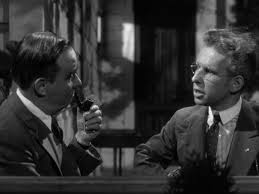
A Hitchcock film just wouldn’t be a Hitchcock film without a smattering of black humour and this is provided by Hume Cronyn’s Herbie Hawkins, a neighbour and aficionado of crime fiction. In some of the film’s more amusing scenes he swaps stories with Joe on the very subject of homicide and how he would go about realising the perfect murder – ‘I’d murder you so it wouldn’t look like murder.’ Meantime, Uncle Charlie’s suspicious manner has continued, particularly with regard to some missing pages from the evening paper which he has purloined. The first manifestation of a physical threat raises its head when the innocent Charlie spots these and pulls them out of his jacket. ‘It’s none of your business!’ he yells at her as he takes on a far more menacing persona. Uncle Charlie is also not best pleased when two men come to the house supposedly representing the National Public Survey. When the older of the two – Fred Saunders (Wallace Ford) – takes Uncle Charlie’s picture, the latter insists that he hand him over the roll of film. The younger man – Jack Graham (Macdonald Carey) – invites Charlie out on a date that same evening. He reveals to her that he is in fact a detective and that Uncle Charlie is one of two men suspected of being the Merry Widow Murderer (the other suspect is in the East). Still trusting of her relation, Charlie vocally dismisses such a notion, but she later rushes to the public library to read the paper from which Uncle Charlie had removed some pages. The article, which she peruses with a horrific look, concerns the location of this Merry Widow Murderer and the nationwide search for the man who has strangled a number of wealthy widows. The following day, Charlie remains in her room until dinnertime (as a means of avoiding her uncle) raising, in the process, his wariness as to her inklings. But Uncle Charlie is not exactly subtle on the subject and there follows a memorable scene in which he boisterously denounces the, ‘silly wives…useless women,’ whose husbands have passed on. An indelible side focus by Hitchcock’s camera heightens the tension as Uncle Charlie lambastes these, ‘horrible, faded, fat, greedy women,’ who, he is quite certain, have no good place in the world or his universe. Charlie storms out of the house on the pretext of being upset at Joe and Herbie’s latest round of homicidal-fixated conversation, but Uncle Charlie pursues her. He takes her into a seedy bar – an establishment which he knows (as does the viewer) is entirely alien to her. Again there is the reminder of the familial link and the even closer bond that exists between the pair as he describes them being, ‘like twins,’ and how, ‘the same blood runs through our veins.’ ‘How could you do such things?’ she asks as she finally confronts him about his alleged crimes. ‘We thought you were the most wonderful man in the world.’ Uncle Charlie takes the opportunity of reminding his niece of her small-town environs and the limited world vision she herself may still retain (much as she doesn’t want to as evidenced in that earlier scene in which she first appeared) – ‘You’re just an ordinary little girl living in an ordinary little town,’ he coldly observes, ‘and I brought you nightmares.’
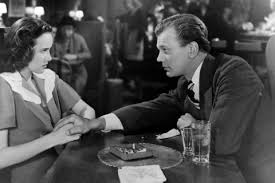
Graham and Saunders appear again after Sunday Service and inform Charlie that, in spite of his best efforts, they managed to take a picture of Uncle Charlie which may serve to identify him as the guilty party. A subsequent conversation between Joe and Herbie – which both Charlie and her uncle overhear – reveals that the other suspect in the East has been killed whilst trying to escape from the authorities. Now it seems apparent that Uncle Charlie is off the hook and, indeed, the two detectives are convinced the other party was the Merry Widow Murderer. But the very real threat to Charlie herself remains and Hitchcock posits this with a close-up of Uncle Charlie’s hands as they menacingly twist into a strangling position. Charlie has a subsequent accident on the stairs one evening and, quite correctly, guesses that her uncle has orchestrated this. ‘The most sensible thing is for you to be friends with me,’ he tells her. He also reminds her of the fog of disgrace which may descend on Charlie’s family if he were to be exposed, and the deleterious effect this would have on his doting sister – ‘What would become of all of you if the truth came out?!’ Another mishap befalls the young woman when she is trapped in the garage with a running car on the evening Uncle Charlie is due to address a local association. The unlikely figure of Herbie comes to Charlie’s rescue, but there is little doubt in her mind that Uncle Charlie is now determined to silence her forever. An ace in the pack comes her way when she finds the emerald ring again and displays it on her finger. Realising that this piece of jewelley is tantamount to physical evidence, Uncle Charlie declares that he is leaving Santa Rosa for the reason of business affairs he must attend to elsewhere. It’s a final ruse on his part, of course, and on the departing train he detains Charlie with the explicit intent of pushing her from the carriage when it has accelerated – ‘I’ve got to do this Charlie. So long as you know what you know about me.’ Charlie resists this and in the ensuing struggle Uncle Charlie is the one who falls to his death in the path of an oncoming locomotive. In the film’s final scene, Charlie stands outside the church with Graham as the priest is overheard from within delivering a wordy eulogy on the deceased man. Only Charlie and the detective know the truth about her uncle and a tacit understanding exists between them that this will remain the case. ‘He said people like us had no idea what the world was really like,’ the young woman says in a final observation. Uncle Charlie may be dead, but his malevolent spirit pervades with respect to his unqualified scorn for the world. It’s far from a perfect universe in which individuals of his twisted bent of mind exist and this cover-up (on the part of Charlie and Graham) ensures that this sinister evil, as personified by Uncle Charlie, has not been extinguished; rather it resides at surface level and is temporarily dormant until such time as another character in the mould of Uncle Charlie comes along.
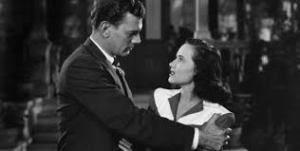
Based on the true story of Earle Leonard Nelson, a mass murderer of the 1920s (just as 1960’s Psycho source material was based on Ed Gein), Shadow of a Doubt was Hitchcock’s own personal favourite film of his own as revealed in interviews with Fletcher Markle and French film director Francois Truffaut. The director’s daughter, Patricia Hitchcock, confirmed as much in the documentary Beyond Doubt: The Making of Hitchcock’s Favourite Film, and there is little argument as to the elevated place Shadow deserves in the master of suspense’s overall filmography. Like another film of his from the same decade (namely 1946’s Notorious), Shadow of a Doubt explores the theme of trust, albeit from quite a different slant. Charlie has a romanticised conception of her uncle which has been passed on by her mother who, herself, is flawed on account of her uncritical fondness for her younger brother. The debonair Uncle Charlie plays on this naturally, but he also buys into the idea of blood being thicker than water. Hitchcock draws our attention to this in a tracking shot as Charlie walks ahead of him from the station platform early in the film and he proudly gazes upon her figure and stride. When asked what was the predominant theme of his 1943 film, Hitchcock simply replied, ‘Love and good order is no defence against evil.’ Uncle Charlie’s baleful shadow is the very one which continues to loom at the film’s end and we cannot help but wonder how many more of his like may be out there. He suggests as much himself in the aforementioned bar scene when vaguely mocking Charlie for her somewhat insular mentality which – ultimately – desires the same comforts and security her father Joe has provided her mother and the family with. Don’t overlook the fact that the clean-cut and angular-featured Detective Jack Graham asks her to marry him. In spite of her high-minded principles and notions, Charlie will eventually fall in line and become one of the middle class too. This is hinted at in the bank scene which I referenced earlier. The young woman knows her place even if she notionally resists it. Uncle Charlie, on the other hand, is a creature of a very different kind, defiant to the last and violent in his rebellion against the ordinary petty world as he perceives it. There’s so much to recommend in this great film, not least the sterling direction of its helmer, the photography of DOP Joseph A. Valentine and the central performances of Wright and Cotten. The Virginia-born actor, when referencing his lengthy career, once commented how, ‘Orson Welles lists Citizen Kane as his best film, Alfred Hitchcock opts for Shadow of a Doubt, and Sir Carol Reed chose The Third Man – and I’m in all of them.’ Quite a thing to be able to say about one’s chosen profession. And, in this particular instance, a suspense film of the highest order.
I love this so much I wrote a book about it which you should enjoy! https://www.amazon.co.uk/Girl-Who-Knew-Too-Much-ebook/dp/B01KTWF08U/ref=sr_1_3?ie=UTF8&qid=1496224933&sr=8-3&keywords=elaine+lennon
I must read that Elaine. A great film indeed which gets better with each viewing. Having recently watched the documentary Hitchcock/Truffaut, I’ve been in a mood for the master of suspense’s movies. Check out other recent blogs on The Lady Vanishes, Notorious and The Trouble with Harry.
I have!! I’m obsessed with him. There are weeks where I watch nobody else!
There are much worse things to do and few better filmographies than Hitchcock’s. His films simply continue and will continue to stand the test of time.
Well you might be interested in my latest essay on Offscreen dealing with Hitch’s collaborations with Grace Kelly: http://offscreen.com/view/hitchcock-kelly.
I shall have a read Elaine – thanks. Now I’m inspired to watch Rear Window again!!